
|
NOVEMBER 2007 EDITION:
Discover the Scientific and Technological Muslim Heritage in Our World |
Introducing FSTC |

| The Foundation for Science Technology and Civilisation (FSTC) is a United Kingdom based educational entity which was formed to popularise, disseminate and promote an accurate account of Muslim Heritage and its contribution to present day science, technology and civilisation. Read more. |
1001 Inventions Exhibition in Glasgow |
After Manchester, Birmingham and Cardiff, the touring exhibition 1001 Inventions begins at the Glasgow Science Centre since October 23, 2007. |
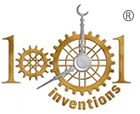
| Location: Glasgow Science Centre
Venue Dates: Oct 24, 2007 - January 8, 2008
Exhibition Guide: Click here to download
Read more. |
New Publications on MuslimHeritage.com |
A compilation of our most recent publications on various aspects of Muslim heritage: scientific, technological, historical and cultural. |
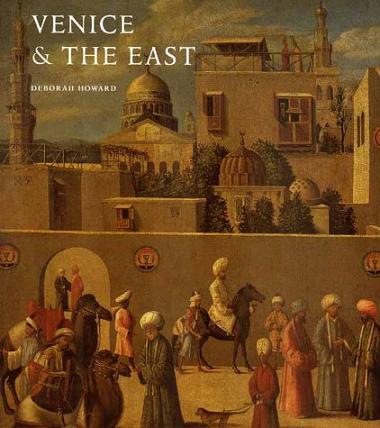
| A Wealth of Scholarship: Recent Publications in Islamic Art, Culture and History
This is a general review of some 23 recent publications (books, films, and articles) on various aspects of Islamic culture, history and civilisation. The survey concentrates on titles related to three categories: art and architecture, Islamic history and culture and Islam-Europe exchanges in medieval times. |
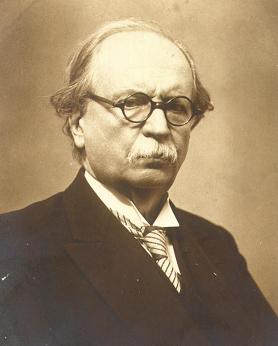
| Famous Figures of the Modern Turkish Medical School
To throw light on famous figures of the Turkish modern medical school, this article introduces a set of nine posters on the contribution of eight late Ottoman and early Turkish physicians (whose careers spanned from the middle of the 19th century until the mid-20th century). |
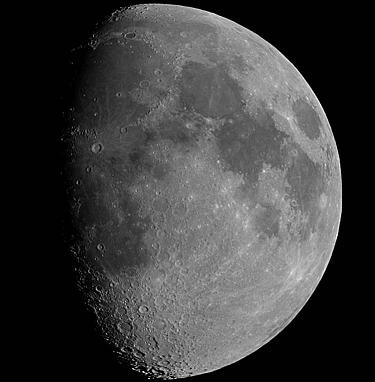
| Illustrious Names in the Heavens: Arabic and Islamic Names of the Moon Craters
24 craters of the Moon bear names of Arabic and Islamic origin. In majority, these names are those of famous scholars of Islamic civilisation. We present below a list of those crater-names on the Moon, with their geographical coordinates and biographical sketches on the scholars thus honoured and immortalized. |

| Recognizing a Decisive Tribute: Islam's Contribution to Western Civilization
This is a review of What Islam Did For Us: Understanding Islam's Contribution to Western Civilization, a book by Tim Wallace-Murphy that emphasizes Islam's immense contributions to the Western civilization in many groundbreaking domains such as education, science, architecture, medicine and social organisation. |
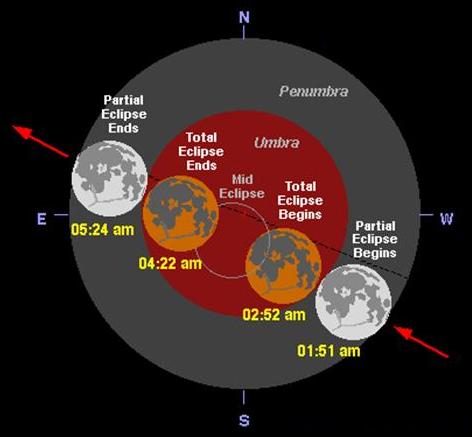
| Precious Records of Eclipses in Muslim Astronomy and History
On the occasion of the lunar eclipse that occurs on 28 August 2007, we produce a short survey of some records of lunar and solar eclipses reported on in Muslim heritage, drawn from various sources, including astronomical texts of professional historians as well as the books of history, chronicles and annals. |
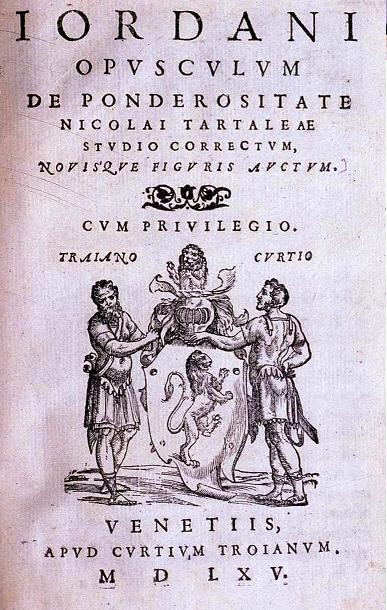
| The Arabic Sources of Jordanus de Nemore
The following article by Professors Menso Folkerts and Richard Lorch, from Munich University in Germany, describes the influences of Arabic sciences in the works of Jordanus de Nemore, a scholar who flourished in Western Europe in the 13th century. |

| Echoes of What Lies Behind the 'Ocean of Fogs' in Muslim Historical Narratives
This article is an edited version of the article originally written by the late Professor Mohammed Hamidullah, "Muslim Discovery of America before Columbus", Journal of the Muslim Students' Association of the United States and Canada. It accounts in part for the ongoing debate about a possible discovery of America before Columbus. |
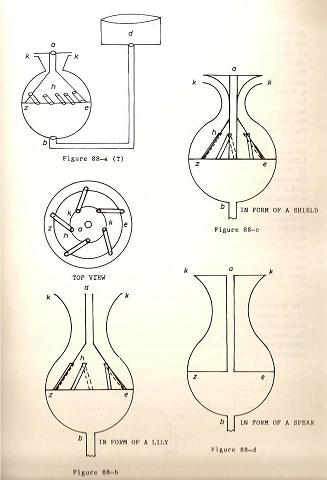
| The Mechanics of Banu Musa in the Light of Modern System and Control Engineering
This article is a review of the book published recently by Professor Attila Bir (Istanbul Technical University, Faculty of Electrical and Electronics Engineering, Istanbul) on Banu Musa's book of mechanics studied in the framework of modern system and control engineering. |

| Leonard of Pisa (Fibonacci) and Arabic Arithmetic
Professor Charles Burnett shows that Fibonacci failed to give adequate recognition to other sources of learning which he took from to produce his Liber Abacci. These other sources were translations of Arabic works from Toledo and Sicily. |
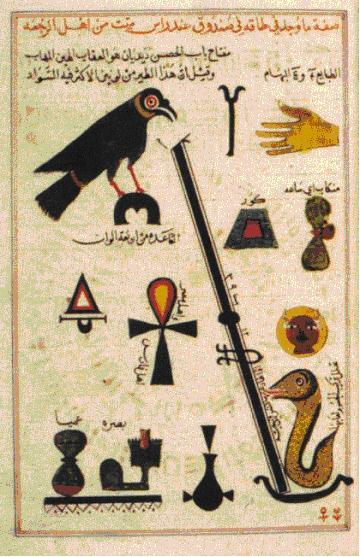
| Deciphering Egyptian Hieroglyphs in Muslim Heritage
The article surveys some results of Okasha El Daly's exciting discoveries about the precedence of Muslim scholars of the Golden Age of Islamic culture in deciphering the hieroglyphs of Ancient Egypt. |
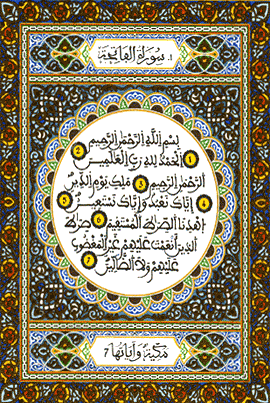
| Tolerance or Compatibility? The Search for a Qur'anic Paradigm of Science
An authoritative study by Ahmad Dallal relating to some episodes of the exegesis of the scientific verses of the Qur'an, the Holy text of Islam, focusing on the exegesis (tafsir) of Fakhr al-Din al-Razi. |

| Hindiba: A Drug for Cancer Treatment in Muslim Heritage
A detailed study by Nil Sari investigating the historical and medical aspects of the lasting fate of the hindiba, a plant of Middle Eastern lands that was under scrutiny in the different periods of Islamic medicine for its therapeutic value as a drug for the treatment of various diseases, including cancer. |

| Copernicus and Arabic Astronomy: A Review of Recent Research
A selected list of references documenting the influence of Islamic astronomy, mainly that of the Maragha observatory, on the astronomical and mathematical models described by Copernicus, published on the occasion of 464th anniversary of his death. |
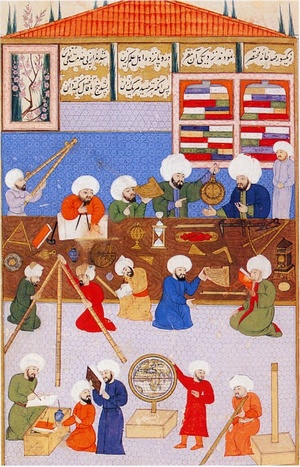
| Rediscovering Arabic Science
This article presents the folder on Arabic and Islamic science published by the magazine Saudi Aramco World (issue May-June 2007). The folder consists of three articles illustrated with a rich iconography, accompanied with illuminating explanatory captions. They were written by Richard Covington, a journalist based in Paris, who collaborates with several newspapers and Medias. |

| The Appreciation of Arabic Science and Technology in the Middle Ages
This article by Charles Burnett describes the appreciation of Arabic science and technology in the Middle Ages through the example of Adelard of Bath, an English scholar of the early 12th century. |
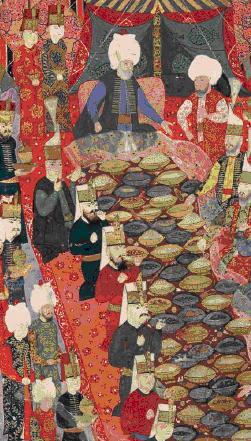
| The Influence of Islamic Culinary Art on Europe
This paper describes the results of a novel research on the Muslim influence on the European culinary art during the Renaissance. Presenting evidence of how this influence entered the aristocratic circles in Europe, it draws attention to the way in which it shaped the use and trade of spices. |

| The Syriac-speaking Christians and the Translation of Greek Science into Arabic
John Healey describes in this penetrating analysis the key role in the development of Muslim science which was played by the Syriac-speaking Christians in the early Islamic era. |

| Süleymaniye Medical Madrasa
Salim Ayduz discusses the emergence and origins of institutional Ottoman medical practice and learning, and provides an insight into the trade of expertise between the Ottoman provinces and further a field, focusing on the Süleymaniye medical school built by Süleyman the Magnificent in the middle of the 16th century in Istanbul. |
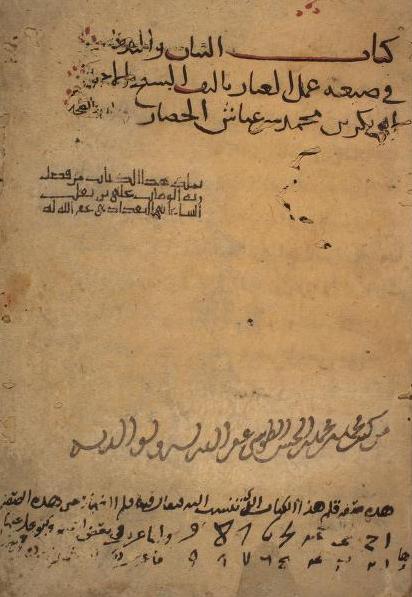
| Al-Hassâr's Kitâb al-Bayân and the Transmission of the Hindu-Arabic Numerals
This article by Paul Kunitzsch presents a new manuscript of the mathematical work Kitâb al-Bayân by the Moroccan mathematician of the 12th century Al-Hassâr, together with related remarks on the transmission of the Hindu-Arabic numerals to the medieval West. |

| The Arabic Partial Version of Pseudo-Aristotle's Mechanical Problems
Based on manuscript evidence, the article authored by Mohammed Abattouy analyses the historical and textual traditions of a fragment of Arabic mechanics which is also edited in Arabic and translated into English. This fragment, entitled Nutaf min al-hiyal, presents an Arabic translation of the theoretical part of the Probelama mechanica, a famous treatise of ancient mechanics attributed to Aristotle. |
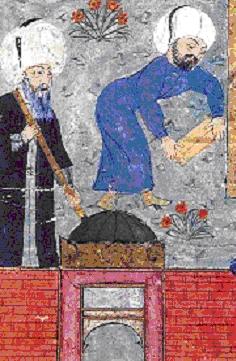
| Sinan: A Great Ottoman Architect and Urban Designer
Mimar Sinan is the most celebrated of all Ottoman architects. His architectural models, perfected in the construction of mosques and other buildings, served as the basic themes for virtually all later Ottoman religious and civic architecture. |

| Sinan's Acoustical Technology
An account by Mutbul Kayili of a research project studying the acoustical properties of several Ottoman mosques designed by Mimar Sinan in the 16th century. Important conclusions are deduced from this carefully conducted analysis, demonstrating the innovative designs of in-built acoustical systems. |

| 15th Century Islamic Architecture Presages 20th Century Mathematics
Review of the exciting discovery about sophisticated geometry in Islamic architecture, in which geometry meets artistry tile work, published in Science Magazine (vol. 315, n° 1106, 2007) by Peter J. Lu and Paul J. Steinhardt. |
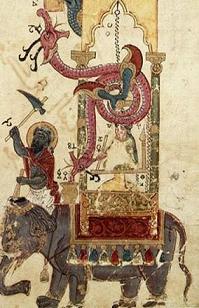
| Automation and Robotics in Muslim Heritage: The Cultural Roots of al-Jazari's Mechanical Systems
An introduction to a longer essay by Gunalan Nadarajan devoted to a new interpretation of the mechanical work of al-Jazari, the famous 13th century Islamic scholar, engineer and scientist. |
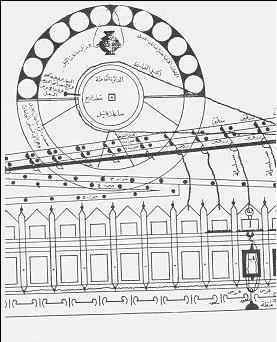
| When Ridhwan al-Sa'ati Anteceded Big Ben by More than Six Centuries
In this article, Abdel Aziz al-Jaraki describes the context of the investigation carried on since several decades on the clock built by Fakhr al-Din Ridhwan al-Sa'ati around 1202 CE and surveys his ongoing endeavours to reconstruct this instrument and make it live again. |
Activities and Announcements |
See other activities of FSTC: |

| Lecture: 1000 Years of Missing Science, Technology and Culture
By Professor Salim Al-Hassani (Chairman, FSTC). Saturday, 3rd November 2007, 2pm, Glasgow Science Center. The first lecture in a series of informative talks in which Professor Al-Hassani explores how discoveries from the Muslim culture between 7th and 17th centuries shaped the future of scientific technologies. Contact: Call 0871 540 1000 to reserve a ticket in advance. |

| Presentation: The Clock of Civilisations
Speakers: Peter Raymond, Prof. El-Gomati, Prof. Al-Hassani and Dr Brennan. Wednesday, 12th September 2007, 17.00 - 19.00, Room 2, Vanbrugh V123, Vanbrugh College, York University. A fascinating presentation on the 800 years old Elephant clock of Al-Jazari which reflects the contributions of Greek, Egyptian, Indian, Chinese and Muslim civilisations. Read more. |
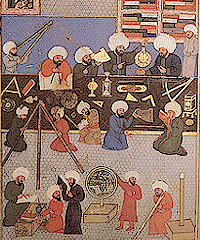
| Lecture: Arabic Astronomy and Its Influence on the Renaissance
By Dr Rim Turkmani (Royal Society Research Fellow, Imperial College). 25 August 2007, Saturday, 6.pm, Thinktank Planetarium. |
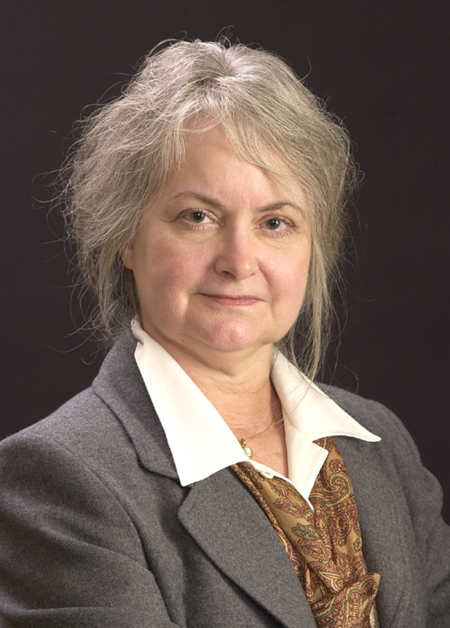
| Lecture: Mapping the Earth in the Medieval Islam
By Professor Emilie Savage-Smith, (Oxford University). 23 August 2007, Thursday, 6.pm, Thinktank Birmingham. |

| 1001inventions on DM Islam TV Channel
TV show series led by Professor Salim Al-Hassani on Muslim scientific and technological inventions and innovations in world history and in present day life. Every Saturday starting 11 August 2007 on SKY 805, at 12.00 - 12.30,UK time. Read more. |
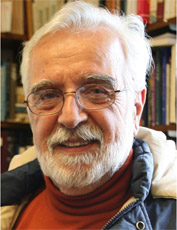
| Lecture: Arabic-Islamic Science and the Making of the Renaissance
By George Saliba, Professor of Arabic and Islamic Science at Columbia University. Venue 1: Saturday, May 26th 2007, 3.30pm, Thinktank Theatre, Thinktank, Millenium Point, Birmingham. Venue 2: Tuesday, May 29th 2007, 6.30 pm, Brunei Gallery Lecture Theatre, SOAS, London. Read more. |
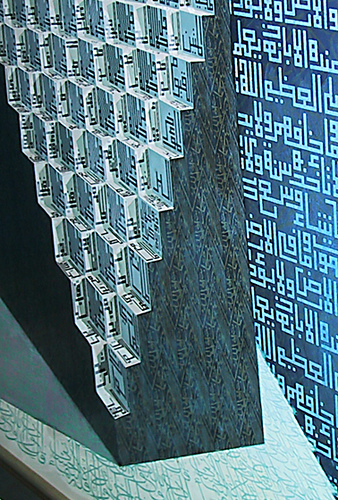
| Lecture: Islam, Modernity and the Enlightenment: A New Perspective
By Samer Akkach. Organised by The Council for Arab-British Understanding and the FSTC. Thursday 3rd May 2007, 6:30pm, Lecture Hall, Royal Asiatic Society, London. Read more. |
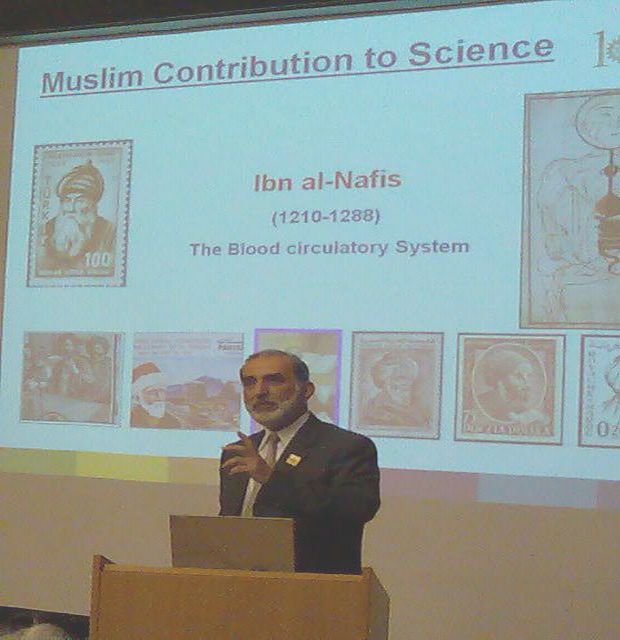
| Lecture: 1001 Nights -v- 1001 Inventions: Muslim Scientific Heritage in Our World
By Professor Salim Al-Hassani (Emeritus Professor, University of Manchester, Chairman, Foundation for Science, Technology and Civilisation). Thursday, 29 March 2007, 6.pm, Royal Society of Arts, Manchester. Professor Al-Hassani will showcase some of the fascinating inventions of this period and explore their relevance to today's world and society. Read more. |
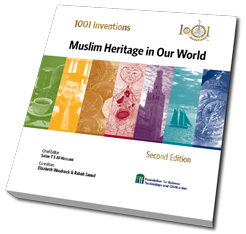
| 1001 inventions: Muslim Heritage in Our World
Chief Editor Salim al-Hassani, Published by FSTC, Manchester, 2006. 1001 Inventions book presents an excellent overview of Muslim heritage written to appeal to the everyday reader and to amaze and redefine many people's current assumptions of medieval times. Read more. |
| Newsletter Team: Chief Editor: Mohammed Abattouy
Deputy Editor: Anne-Maria Brennan
Associate Editor (History of Science): Salim Ayduz
Associate Editor (Education): Ian Fenn
Production Team: Sondoss Al-Hassani, Margaret Morris. |
Published by FSTC - All rights reserved.

http://www.muslimheritage.com/nmanagerpro/inc/rdr.asp?67___071124223140___http://www.MuslimHeriage.com http://www.muslimheritage.com/nmanagerpro/inc/rdr.asp?67___071124223140___http://www.1001inventions.com |
|

























No comments:
Post a Comment